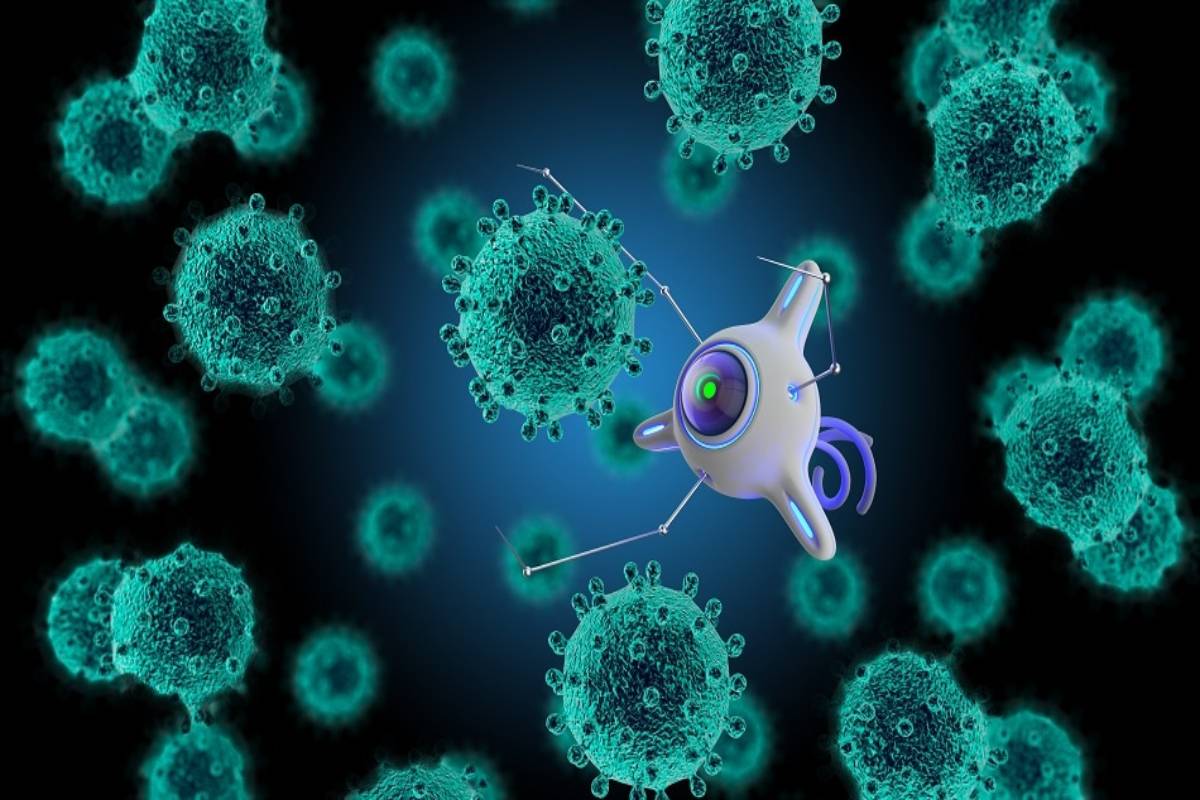Table of Contents
Definition
The nanobot are some tiny robots of a nanometric size and varied forms that can act autonomously.
Thanks to their small measures, they can perform different functions and move quickly, from traveling inside our body to fight many diseases to clean the environment or detect pests.
Here is a fantastic example of a nanobot
You should know that nanobots are machines or robots with a nanometric measurement, that is, of a size relatively close to atoms. These usually measure less than 1 nanometer (1 nanometer = one billionth of a meter).
So, you can imagine it, right? The human eye cannot visualize them.
The science that studies them is called nanotechnology or nanorobotics.
What are the Uses of Nanobots?
- Nanobots are very useful in various fields, developing functions that, to this day, we cannot even imagine.
- For example, in health, they can detect diseases and give adequate doses of medication for treatment according to the problem’s advanced level.
- It capable of detecting dangerous situations in the environment, among many other things.
- Although they are only prototypes, it intends that they are tools of great use for humanity in the long term.
What are the Types of Nanobots?
- Let’s see some of the sites where nanotechnology intends to improve humans’ unfavorable situations and the environment where we develop.
1. Medicine
- The field of medicine is where nanomachines are mostly applications.
- It is because its tiny size facilitates entry into the body to perform tasks.
- These can be varied, such as detecting cancer cells and detecting or replacing neurons with conditions such as Alzheimer’s or Parkinson’s.
- The intention of introducing these DNA nanorobots to the human body is to cure diseases of all kinds, as one of the most vital concerns in medicine, to fight cancer.
- Thus, the intention was born to create nanorobots for cancer that track and destroy cancer cells and tumors without damaging healthy cells in the body.
- For this to be carrying out, it will be necessary for these nanorobots to have essential characteristics such as recognizing the blood vessels that feed cancer cells and recognizing the difference between good and diseased cells.
- The second characteristic that nanorobots must have in medicine is to release a coagulant once they reach their destination.
2. Military
- Nanobots are also being used in the military field, as they have designed and developed self-replicating (capable of duplicating).
- So far, they have been used in military armor with the ability to self-repair when damaged.
- And of course, these military nanorobots can also be used to give target targets greater precision.
- They are thus minimizing the damage to the civilian population.
- Within this field, a large number of applications of nanorobots are developing.
- For example, quantum structures to miniaturize weapons with lasers or cannons.
3. Environment
- It is another field where nanorobotics is using in the environment.
- As we know, one of the most vital concerns for environmental organizations is ocean pollution.
- Contamination has been manifesting by various materials such as plastic, mercury, lead, chromium, and arsenic. And these just a few of the contaminants.
- With nanotechnology’s help, graphene nanobots have been developing, which detect and collect these heavy materials.
What is the Production of Nanobots?
- To create or manufacture nanobot it is necessary to understand genetics, physics, and biochemistry.
- On the one hand, the building material is also essential. Remember that nanobots must move and function properly.
- Typically, oxygen and silicon are choosing to manufacture for their unique characteristics.
- Lastly, make it work. For this, a molecule consisting of two poles was a synthetic one that served as a motor.
- Once the function is achieving, the movement was required, which was acquired by DNA-based cilia. These serve as arms that allow you to move forward.
What are the Essentialities of Nanobot?
- Today this technology is already of great importance, as it solves problems so small that our eyes cannot even perceive them.
- Some nanobots are still prototypes, and it is hoping that it can be used as a tool to cure diseases that are still incurable today in the long term.
- Other fields, such as the environment, see in them an exciting way of controlling environmental impact. Applications in nanotechnology have multiplied exponentially.
- It expects that they will have even more repercussions in the coming years, where they will indeed invade sectors such as medicine, robotics, energy, or home automation. Many analysts speak of it as the industrial revolution of the 21st century.
- Despite the significant advances in the matter and positive prospects. All the successes achieve and following in the future evaluate with caution.
- There are still many questions on issues such as biosecurity, human health, environmental or socio-economic nature.
- In this sense, research is necessary, and it will be what makes progress more or less rapid. Robotics and nanotechnology are the present and will be of great help to us in the future.


